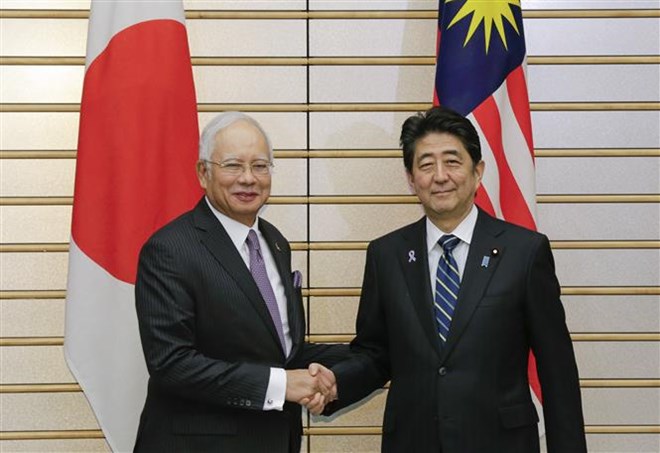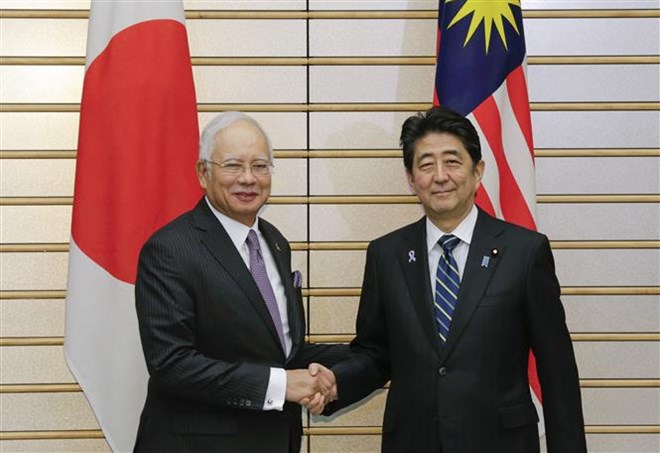
Malaysia and Japan signed an agreement on April 18, paving the way for the transfer of Japanese defence equipment and technology to the Southeast Asian country.

Malaysian Prime Minister Najib Razak (L) and his Japanese counterpart Shinzo Abe shake hands after their meeting in Japan in 2016 (Photo: AFP/VNA).
Speaking with reporters after a signing ceremony on the sidelines of a regional security forum and exhibition in Kuala Lumpur, Japanese Ambassador to Malaysia Makio Miyagawa said the new agreement establishes security cooperation between the two countries and stipulates procedures for each specific transfer and rules on the use of defence equipment and technology.
Malaysia is interested in acquiring from Japan surveillance aircraft, vessels, radar, satellites, communications equipment, and other hardware, Miyagawa said.
In May 2015, Malaysian Prime Minister Najib Razak and his Japanese counterpart Shinzo Abe agreed to start negotiating an agreement on the transfer of defence equipment and technology in the fields of maritime security and disaster relief.
Malaysia is the second country in ASEAN, after the Philippines, which has forged such a deal with Japan.
The Philippines and Japan signed a similar agreement in February 2016. Under the deal, Japan has given the Philippine Navy five trainer aircraft that had been used by its Maritime Self-Defence Force.-
Source: VNA
The first summit between the European Union (EU) and the Gulf Cooperation Council (GCC) in Brussels, Belgium, marked an important step forward in their bilateral relations.
The 45th General Assembly of the ASEAN Inter-Parliamentary Assembly (AIPA-45) opened in Vientiane on October 19.
Many countries are grappling with rapidly aging population. As population aging becomes an irreversible global trend with significant impacts on economic and social sectors, nations face the urgent task of creating flexible policies to adapt to and make the most of this trend to build prosperous and sustainable societies.
With a series of stimulus measures, the world tourism industry is on the way to recovery as before the COVID-19 pandemic broke out. Facing the opportunity to take off, the "smokeless industry” is expected to strongly contribute to global economic growth while promoting potential and cohesion, contributing to peace and sustainable development.
The danger from the COVID-19 pandemic is still latent, threatening people’s health and lives in the context that the immunity provided from the COVID-19 vaccine has decreased. Many other dangerous diseases are also likely to break out when the global vaccination rate slows down, due to inequality in access to health services, vaccine hesitancy, and consequences of economic recession.
The Association of Southeast Asian Nations (ASEAN) is witnessing a rise in the sales of electric vehicles (EVs) in Vietnam, Malaysia and Indonesia, according to Maybank Investment Bank Research (Maybank IB Research).



